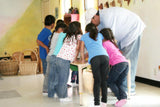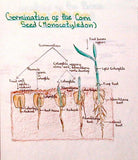Library Lady's Corner
Traditional Tales Retold by Kelly Morrow April 20 2017
Lazy Jack; King Thrushbeard; The Prince and the Dragon; and Sylvain and Jocosa
When class teacher Kelly Morrow’s search for first readers appropriate and challenging for her students proved fruitless, she created her own. The four little books range from 18 to 38 pages. Each book tells a folk story in a simple, clear, but interesting way, and each story is enriched by a moral truth. The cover of each is an engaging color illustration, and there are black and white drawings throughout.
There’s No Minute Like the Last Minute! December 16 2016
Waldorf Publications and the Research Institute for Waldorf Education have many fine possibilities for thoughtful gifts when thoughtfulness in the hectic season becomes hard to muster.Consider the caliber and depth of some of these gifts — remember, books and subscriptions keep giving long into the future!
Being Nine Years Old June 16 2016
The teacher knelt before the boy to explain how to cross the street carefully and to check to see if he felt uneasy about crossing without a teacher holding his hand. The boy’s mother was taking a job in the area and she wanted her children in a Waldorf school. The boy had come to visit the second grade that day. He had, up till then, been home schooled, and there was a question about whether or not the boy belonged in second grade or third grade because of his age—older than the youngest in the third grade and younger than the oldest in the second grade.
After the teacher had completed explaining carefully how to cross the street without a teacher helping him, the teacher asked, “Can you do that?.....
The Waldorf School and the End of Year Report May 27 2016
Assessment is a “hot topic” in the news and in educational debate. In Waldorf schools assessment takes many forms, none of which includes standardized testing.
During the year, concentrated “blocks” of study might include an end-of-block assessment. A block might be three or four weeks long and concentrate study on one topic. After a botany block in the fifth grade an outdoor “treasure” hunt to find, for example, a monocotyledon, a pistil, a tap root, a deciduous conifer branch, a dicotyledon, and so on, might be the "test.” Read More...
Three Timelines in the Education of a Youngster: Three Opportunities for Misunderstanding April 28 2016
Let us think peace and use the understanding of dissimilar timelines to weave collaboration and solutions instead of additional strife in an unsettled and unsettling world. Our children will thrive if we do.Stories for Upper Grade Students April 19 2016
At this time is becomes important to think of the child’s true and higher self. Misdemeanors or illegal actions must be dealt with quickly with appropriate consequences directed but without harshness or judgment. To remember who the child really is in his or her best character, understanding that these developing pre-teens are capable of many downright dumb experiments that instruct and pass away. To give the student the impression that he is condemned to a label of “bad” or “untrustworthy” is unbearable for one so young. This can engender bitterness or instincts of revenge or retaliation. Warmth and decisiveness and unwavering adherence to whatever the consequence is for a misdeed are important. Once the consequence is completed, the youngster should know that the burden of that misdeed is lifted and that the child’s goodness can again prevail. This may need to be repeated a number of time before the young person regains equilibrium.There’s Science and There’s Science! Part II April 12 2016
One cardiologist whose daughter attended a Waldorf school noticed an eighth grader’s illustration of the human heart from anatomy lessons. The cardiologist commented that if the whole team of cardiology under her understood the workings of the heart as well as the Waldorf student who drew that picture, she would have the finest team in the country.Waldorf Education is Developmentally Appropriate - What exactly does this mean? July 26 2015
When Waldorf teachers say their curriculum is developmentally appropriate they mean it! But Waldorf educators understand child development in a unique way. Child development in the Waldorf plan is very specific. The decisions about the curriculum are based on exactly what is happening in the child’s physical, and emotional development and also in the development of the child’s consciousness.Four Phases of Teenage Development Reflected in the Waldorf High School Curriculum June 08 2015

In broad strokes, each of the four years in the Waldorf high school curriculum embodies an underlying theme and method that helps guide students not just through their studies of outer phenomena but through their inner growth as well. Obviously, these themes and methods are adapted to each specific group of students and take account of the fact that teenagers grow at their own pace. Hence, the “broad strokes.” And yet, one can identify struggles common to most any teenager even though adolescents pass through developmental landscape at varying speeds, they nonetheless have to cover similar terrain. READ MORE
The Waldorf Classroom and the Cycle of Eight Elementary Years with the Same Teacher June 03 2015

One characteristic of Waldorf schools in elementary grades is to keep one “Class Teacher” with a class from first through eighth grades. This practice has been adopted by public and private schools and is known as looping. In Waldorf schools this eight-year cycle could be called “giant looping.” Of course, this eight-year cycle is an ideal that is not always possible. Life, marriage, health, age, can all get in the way of completing this commitment. In some Waldorf schools it is even policy to have the looping go from grades... READ MORE
The End of Year Report in Waldorf Schools May 30 2015

Assessment is a “hot topic” in the news and in educational debate. In Waldorf schools assessment takes many forms, none of which includes standardized testing.
During the year, concentrated “blocks” of study might include an end-of-block assessment. A block might be three or four weeks long and concentrate study on one topic. After a botany block in the fifth grade an outdoor “treasure” hunt to find, for example, a monocotyledon, a pistil, a tap root, a deciduous conifer branch, a dicotyledon, and so on, might be the "test.” After a block on physiology in grade seven, an essay entitled, “The Diary of a Sandwich,” might be the means of assessment..... READ MORE
Discovering the Waldorf Pentathlon: An Overview May 20 2015

All across North America during the month of May Waldorf schools gather fifth graders for the annual Pentathlon. Three to seven different schools’ fifth grade classes gather at one hosting Waldorf school to compete in this annual celebration of fifth grade grace, skill, and determination, as a crowning salute to the curriculum of the fifth grade in Waldorf schools around the world. We owe gratitude to the “Spacial Dynamics Movement” for developing this rewarding tradition that gives schools a day of social interaction as well as affirmation of the curriculum, specifically Greek history... READ MORE
"No Homework Day" and Homework in Waldorf Schools May 06 2015

Over the last decade or so homework has taken center stage in many child development debates and research projects. The increased scrutiny has even sparked a national “No Homework Day” which is celebrated today, May 6.
In a child’s early years, there is concern that homework will restrict a child’s active learning by limiting... READ MORE
Every Day is "Tell a Story Day" in a Waldorf School! April 27 2015
Children learn deeply and completely from stories and because of this they play a key role in the Waldorf curriculum. Reprimands, dialogue, cautions, or rebukes might appear to be effective, however, it’s really only stories that can school little ones on the great truths of life, the dangers of straying from the path like Little Red Riding Hood, or the high value of staying connected to nature by being kind to living things as in The Crystal Ball.In the early years the Waldorf curriculum uses fairy-tales, fables, and legends. By grade four Waldorf students are using drama to explore Norse Mythology. In the later grades Greek Mythology, fine literature, and poetry reveal treasured stories such as Percival and Faust. Stories are found throughout the Waldorf curriculum every day.
- Previous
- Page 3 of 3
